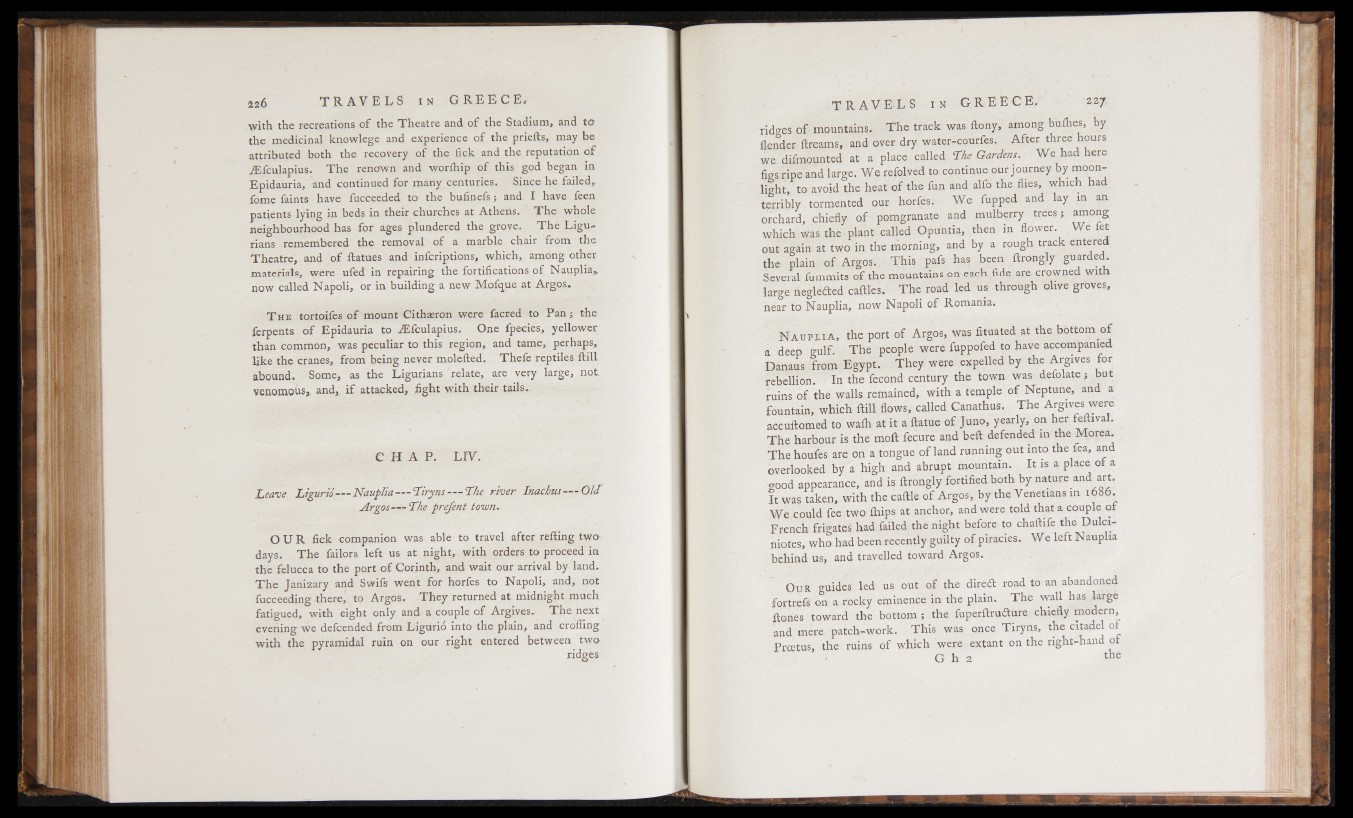
with the recreations of the Theatre and of the Stadium, and to
the medicinal knowlege and experience of the priefts, may be
attributed both the recovery of the lick and the reputation of
Æfculapius. The rencfwn and worfhip of this god began in
Epidauria, and continued for many centuries. Since he failed,
fome faints have fucceéded to the bufinefs; and I have feen
patients lying in beds in their churches at Athens. The whole
neighbourhood has for ages plundered the grove. The Ligurians
remembered the removal of a marble chair from the
Theatre, and of ftatues and infcriptions, which, among other
materials, were ufed in repairing the fortifications of Nauplia*
now called Napoli, or in building a new Mofqpe at Argos. 1
T he tortoifes o f mount Cithæron were facred -to Pan; the
ferpents o f Epidauria to Æfculapius. One fpecies,, yellower
than common, was peculiar to this region, and tame, perhaps,
like the cranes, from being never môlefted. Thefe reptiles ftill
abound. Some, as the Ligurians 'relate, are very large, not.
venomous, and, i f attacked, fight with their tails.. |
C H A P. LTV.
Leave Ligurio— Nauplia — Viryns— Vhe river Inachus— Old
. Argos-«#• Vhe prefent town.
O U R fick companion was able- to travel after retting two
days. The failors left us at night, with orders to proceed in
the felucca to the port of Corinth, and wait our arrival by land.
The Janizary arid Swifs went for horfes to Napoli, and^ not
fucceeding there', to Argos. They returned'at midnight much
fatigued, with eight only and a couple of Argives.. The next
evening we defcended from Ligurid into the plain, and eroding
with the pyramidal ruin on our right entered between two
ridges
227.
ridges ol' toountainsi. T h e track-was ftoriy, among bufhes, by
diender ftreams, and over dry water-courfes. After three hours
we difmounted at a "place called Vhe Gardens. We had here
figs ripe and large. We refolved to continue ouÿourney by moonlight,
to avoid the heat of the fun and alfo the-fires,, which had.
terribly tormented our. horfes; We Topped and lay in an
'Orchard, chiefly of pomgranate and mulbfïry treefj among
which was the-.plant called Opuntia, then in flower. We let
out again at two in the morning, and by a rough track entered
the plain of,Argos.. This pafs has been ftrongly guarded.
Several fummits of the mountains,on each .fide are crowned with
large rieglééted cattles.' The road' led us* through olive groves,
near to Nauplia,. now Napioli of Romania.
Nauplia, the port of Argos, was fituated at the bottom of
a deep gulf. The people were fuppofed to have accompanied
Danaus from Egypt. They were expelled by the Argives for
rebéllióri. In the fécond century the town was delpUte; bpt
ruins'oh the walls remained, with a temple' o f * Neptune, and a
fountain, which ftill flows, called Canathus. The Argives were
accuftomed to wafli at it a ftatue of Juno, yearly, qn her feftival.
The harbour is the moft fpcure .and beft defended in the Morea.
The houles are on a tongue of land running out into the lea, and
' overlooked by a high and abrupt naountain.^. It is a place of a
good appearance, and is ftrongly fortifiedhpth by nature and art,
I t was taken, with the cattle o f Argos^ by the Venetians m. 1 ^ 6 .
We'could fee two Ihips at anchor, and were told that a couple,of
French frigates had failed the night, before to chaftife the Dulci-
nibtes, who had beeii reeebtly guilty of piracies. We left Nauplia
behind us, and travelled toward1 Argos.
O ur guides led us out of the direct road to an abandoned
fortrefé on a rocky eminence in the plain. The wall ha|i>rge
hones toward the bottom;.the fuperftrudture chiefly, modern,
and mere patch-work. ‘ This was once Tiryns, the citadel of
Prcetus, the ruins of which were extant on the right-hand of
• G h 2 the